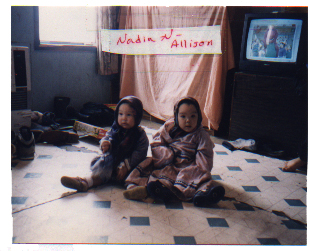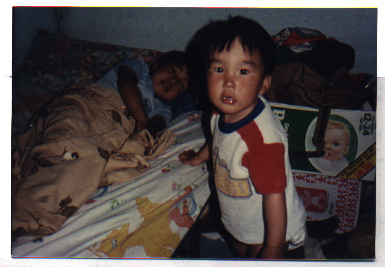|
|
|
 Marshall
Cultural Atlas Marshall
Cultural Atlas
This collection of student work is from
Frank Keim's classes. He has wanted to share these works for others
to use as an example of Culturally-based curriculum and documentation. These
documents have been OCR-scanned. These are available
for educational use only.
EMOTIONAL AND SOCIAL DEVELOPMENT
|
13 to 15 MONTHS
|
Emotional
Shows pride in personal accomplishment.
Is more demanding and more self-assertive.
Likes to exhibit affection to humans and to objects as
well.
Prefers to keep parent or caregiver in sight while exploring
environment.
Demands personal attention.
May show fear of strangers.
Shows increased negativism.
May become attached to a special toy.
Social
Enjoys solitary play.
Enjoys play with older siblings or parents.
Shows preference for family members over others.
Shows off for an audience.
Is easily diverted and entertained.
Likes to go for buggy, stroller, or car rides.
Recognizes self in mirror and may communicate with
sounds.
|
|
16 to 18 MONTHS
|
Emotional
Is still egocentric.
Response to parents' emotional expressions by imitating
them.
Is emotionally unpredictable and may respond differently at
different times.
Hugs favorite toys and may carry them all the time.
May hug pets too hard when wanting to show affection.
Is unable to tolerate frustration.
May be less afraid of strangers.
May reveal negativism and stubborness.
May exhibit fear of thunder, lightning, larger animals,
etc.
Enjoys ability to do things independently.
Social
Is very socially responsive to parents and
caregivers.
Demands personal attention from family members.
Hands object to parent and waits reaction expentantly.
Responds to simple request.
Realizes different people react in different ways.
Enjoys social play before bedtime.
May punch and poke other toddlers as if they were
objects.
Will perform for an audience.
Likes to chase and be chased.
Is unable to share.
|
|
19 to 21 MONTHS
|
Emotional
May show increasing need for security object.
May direct anger at person responsible for frustration.
May reveal feelings of jealousy.
May become more possessive about toys, hiding them from
others.
Likes to claim things as "mine."
Gives up items that belong to others upon request.
Begins to show sympathy to another child or adult.
Does not yet understand cooperation, but maybe able to
cooperate some of the time.
Social
Continues to desire personal attention.
Likes to help with simple household tasks.
Indicates awareness of absence of person by saying "bye-bye."
Likes to repeat experiences in simple terms.
Responds less quickly to requests, and may respond in
opposite manner.
May enjoy removing clothing and is not embarrassed about
being naked.
Enjoys dressing up in adult clothing.
May ask for permission to do things.
Reveals a sense of trust in adults.
Plays contentedly alone if near adults.
Likes to play next to other children, but does not interact
with them.
Tries to imitate play activities of older siblings.
Engages in imaginative play involving daily routines such as
eating or going to sleep.
Is able to play some simple interacting games for short
periods of time.
|
|
22 to 24 MONTHS
|
Emotional
Display signs of love for parents and other favorite
people.
May express increased possessive attitude.
Is easily hurt by criticism.
Is afraid of disapproval and rejection.
Becomes frustrated easily.
May show some aggressive tendencies, such as slapping,
biting, hitting.
May assume increasingly self-sufficient attitude.
Has strong positive or negative reactions.
Wants own way in everything.
Recognizes own power to be effective.
May dawdle but desires to please parents.
Social
Is more responsive to adults, and is also more demanding
of adults.
Shows genuine interest in mother-baby relationships.
Is occasionally hostile to siblings if frustrated.
Desires approval in social situations.
Still prefers to play alone, but likes to be near
others.
Enjoys water play.
Likes to "dance" to music.
Engages in imaginative play related to parents' actions.
Uses own name in reference to self when talking with
others.
Is continually testing limits set by parents and
caregivers.
Likes to control others and give them orders.
|

|
24 to 30 MONTHS
|
Emotional
Continues to be self-centered.
May exhibit increasing independence one minute and then run
back to security of parents the next.
Likes immediate gratification of desires and find it
difficult to wait.
May exhibit negativism.
Has trouble understanding sharing but may give back toy that
belongs to someone else.
Continues to seek parental approval for behaviors and
accomplishments.
Displays jealousy.
May develop fear of dark; needs reassurance.
Social
Likes to play near other children, but is unable to play
cooperatively with them.
Becomes a "grabber," may grab desired toys away from other
children.
Does not like to share toys.
Has not learned to say "please" but often desires toys of
other children.
Likes to give affection to parents.
May pull hair or bite before giving a prized possession.
|
|
30 to 36 MONTHS
|
Emotional
May display negative feelings and occasional temper.
May exhibit aggressiveness .
May dawdle but insists on doing things for self.
Likes to dress self and needs praise and encouragement when
correct.
Bills that when reprimanded for mistakes.
Desires parental approval.
Wants independence but shows fear of new experiences.
May reveal need for clinging to security object.
May exhibit fear and needs reassurance in fearful
situations.
Needs an understanding, orderly environment.
May have trouble sleeping if day's events have been
emotional.
Social
Continues to feel a strong sense of ownership but may
give up toy if offered a substitute.
May learn to say "please" if prompted.
As increased desire to play near and with other
children.
May begin cooperative play.
Distinguishes between boys and girls.
Likes to be accepted by others.
May continue to show aggressive actions in getting own way
while playing with other children.
Enjoys hiding from others.
Likes to play with adults on one-to-one basis.
Enjoys tumbling play with older siblings and parents.
|

What Worked
For My Parents in Raising
Their Kids
What
My Parents
Would Have Done Differently
If They Could Do It Over
Again
Advice
From Parents
To Young Parents
Useful
information
for parents
The
Kids
Student
Do's and Do Not's about Parenting
Gems
of Wisdom from
the Elders
Christmastime Tales
Stories real and imaginary about Christmas, Slavik, and the New Year
Winter, 1996 |
Christmastime Tales II
Stories about Christmas, Slavik, and the New Year
Winter, 1998 |
Christmastime Tales III
Stories about Christmas, Slavik, and the New Year
Winter, 2000 |
| Summer Time Tails 1992 |
Summertime Tails II 1993 |
Summertime Tails III |
| Summertime Tails IV Fall, 1995 |
Summertime Tails V Fall, 1996 |
Summertime Tails VI Fall, 1997 |
| Summertime Tails VII Fall, 1999 |
Signs of the Times November 1996 |
Creative Stories From Creative Imaginations |
| Mustang Mind Manglers - Stories of the Far Out,
the Frightening and the Fantastic 1993 |
Yupik Gourmet - A Book of
Recipes |
|
| M&M Monthly |
|
|
| Happy Moose Hunting! September Edition 1997 |
Happy Easter! March/April 1998 |
Merry Christmas December Edition 1997 |
| Happy Valentine’s
Day! February Edition
1998 |
Happy Easter! March/April Edition 2000 |
Happy Thanksgiving Nov. Edition, 1997 |
| Happy Halloween October 1997 Edition |
Edible and Useful Plants of Scammon
Bay |
Edible Plants of Hooper Bay 1981 |
| The Flowers of Scammon Bay Alaska |
Poems of Hooper Bay |
Scammon Bay (Upward Bound Students) |
| Family Trees and the Buzzy Lord |
It takes a Village - A guide for parents May 1997 |
People in Our Community |
| Buildings and Personalities of
Marshall |
Marshall Village PROFILE |
Qigeckalleq Pellullermeng ‘A
Glimpse of the Past’ |
| Raven’s
Stories Spring 1995 |
Bird Stories from Scammon Bay |
The Sea Around Us |
| Ellamyua - The Great Weather - Stories about the
Weather Spring 1996 |
Moose Fire - Stories and Poems about Moose November,
1998 |
Bears Bees and Bald Eagles Winter 1992-1993 |
| Fish Fire and Water - Stories about fish, global warming
and the future November, 1997 |
Wolf Fire - Stories and Poems about Wolves |
Bear Fire - Stories and Poems about Bears Spring,
1992 |
|
 The
University of Alaska Fairbanks is an Affirmative
Action/Equal Opportunity employer, educational
institution, and provider is a part of the University of Alaska
system. Learn more about UA's notice of nondiscrimination. The
University of Alaska Fairbanks is an Affirmative
Action/Equal Opportunity employer, educational
institution, and provider is a part of the University of Alaska
system. Learn more about UA's notice of nondiscrimination.
Alaska Native Knowledge
Network
University of Alaska Fairbanks
PO Box 756730
Fairbanks AK 99775-6730
Phone (907) 474.1902
Fax (907) 474.1957 |
Questions or comments?
Contact ANKN |
|
Last
modified
August 24, 2006
|
|
|